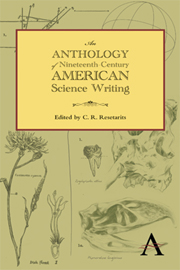Book contents
- Frontmatter
- Contents
- Preface
- Part One 1800–1846 Naturals and Naturalists
- Part One Introduction
- “A Memoir on the Discovery of Certain Bones of a Quadruped of the Clawed Kind in the Western Parts of Virginia,” Transactions of the American Philosophical Society (1799)
- “Pileated Woodpecker,” American Ornithology; or the Natural History of the Birds of the United States (1801)
- “Currents,” The New American Practical Navigator (1802)
- “Account of a North American Quadruped, supposed to belong to the Genus Ovis, Rocky-Mountain Sheep, Ovis Montana,” Journal of the Academy of Natural Sciences of Philadelphia (1817)
- “A Monograph of North American insects, of the genus Cincindela” (excerpt) Transactions of the American Philosophical Society (1818)
- “On the Genus Ocythoe,” Philosophical Transactions of the Royal Society of London (1819)
- “Preface,” American Entomology, or Descriptions of the Insects of North America (1824–28)
- “Preface” (excerpt), The Genera of North American Plants and a Catalogue of the Species, to the Year 1817 (1818)
- “Pileated Woodpecker,” Manual of the Ornithology of the United States and Canada (1832)
- “Introduction,” Ichthyologia ohiensis, or natural history of the fishes inhabiting the river Ohio and its tributary streams (1820)
- “Notices of Materia Medica, or new medical properties of some American Plants,” Western Minerva or, American Annals of Knowledge and Literature (1820)
- “Passenger Pigeon,” Ornithological Biography (1831)
- “On the Production of Currents and Sparks of Electricity from Magnetism,” American Journal of Science and Arts (July 1832)
- “The Contagiousness of Puerperal Fever” (excerpts), New England Quarterly Journal of Medicine (1843)
- “On the Two Storms Which Were Experienced throughout the United States, in the Month of February, 1842” (excerpt) Transactions of the American Philosophical Society (1845)
- Part Two 1846–1876 Warriors
- Part Three 1876–1900 Scientists
- Bibliography
“A Memoir on the Discovery of Certain Bones of a Quadruped of the Clawed Kind in the Western Parts of Virginia,” Transactions of the American Philosophical Society (1799)
from Part One - 1800–1846 Naturals and Naturalists
Published online by Cambridge University Press: 05 June 2012
- Frontmatter
- Contents
- Preface
- Part One 1800–1846 Naturals and Naturalists
- Part One Introduction
- “A Memoir on the Discovery of Certain Bones of a Quadruped of the Clawed Kind in the Western Parts of Virginia,” Transactions of the American Philosophical Society (1799)
- “Pileated Woodpecker,” American Ornithology; or the Natural History of the Birds of the United States (1801)
- “Currents,” The New American Practical Navigator (1802)
- “Account of a North American Quadruped, supposed to belong to the Genus Ovis, Rocky-Mountain Sheep, Ovis Montana,” Journal of the Academy of Natural Sciences of Philadelphia (1817)
- “A Monograph of North American insects, of the genus Cincindela” (excerpt) Transactions of the American Philosophical Society (1818)
- “On the Genus Ocythoe,” Philosophical Transactions of the Royal Society of London (1819)
- “Preface,” American Entomology, or Descriptions of the Insects of North America (1824–28)
- “Preface” (excerpt), The Genera of North American Plants and a Catalogue of the Species, to the Year 1817 (1818)
- “Pileated Woodpecker,” Manual of the Ornithology of the United States and Canada (1832)
- “Introduction,” Ichthyologia ohiensis, or natural history of the fishes inhabiting the river Ohio and its tributary streams (1820)
- “Notices of Materia Medica, or new medical properties of some American Plants,” Western Minerva or, American Annals of Knowledge and Literature (1820)
- “Passenger Pigeon,” Ornithological Biography (1831)
- “On the Production of Currents and Sparks of Electricity from Magnetism,” American Journal of Science and Arts (July 1832)
- “The Contagiousness of Puerperal Fever” (excerpts), New England Quarterly Journal of Medicine (1843)
- “On the Two Storms Which Were Experienced throughout the United States, in the Month of February, 1842” (excerpt) Transactions of the American Philosophical Society (1845)
- Part Two 1846–1876 Warriors
- Part Three 1876–1900 Scientists
- Bibliography
Summary
In a letter of July 3d, I informed our late most worthy president that some bones of a very large animal of the clawed kind had been recently discovered within this state, and promised a communication on the subject as soon as we could recover what were still recoverable of them. It is well known that the substratum of the country beyond the Blue Ridge is a limestone, abounding with large caverns, the earthy floors of which are highly impregnated with nitre; and that the inhabitants are in the habit of extracting the nitre from them. In digging the floor of one of these eaves, belonging to Frederic Cromer in the country of Greenbriar, the labourers at the depth of two or three feet, came to some bones, the size and form of which bespoke an animal unknown to them. The nitrous impregnation of the earth together with a small degree of petrification had probably been the means of their preservation. The importance of the discovery was not known to those who made it, yet it excited conversation in the neighbourhood, and led persons of vague curiosity to seek and take away the bones. It was fortunate for science that one of its zealous and well-informed friends, Colonel John Stewart of that neighbourhood, heard of the discovery, and, sensible from their description, that they were of an animal not known, took measure without delay for saving those which still remained.
- Type
- Chapter
- Information
- Publisher: Anthem PressPrint publication year: 2012



